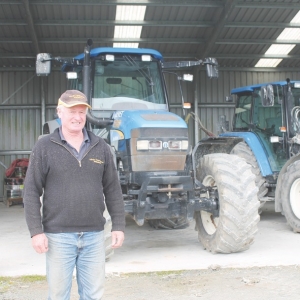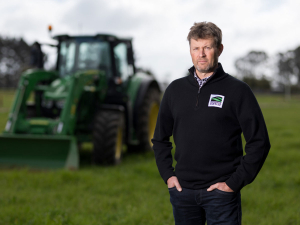“The dairy farmers are really the ones who pay the bills. With the payout almost double last year’s, there’s going to be a lot more money in circulation. The contractors will hopefully get the spin off from that,” he told Dairy News.
Last year the whole industry was hit by drought on top of a lower payout and is still in recovery.
Levet was elected president last month and is ready to lend his weight to initiatives the 470-member association has underway. These include lobbying government on seasonal workers and trying to attract the brightest young people to all areas of agriculture, including contracting.
About three quarters of his rural contracting work comes from dairy farms and that would be true for most contractors, says Levet. He is an Albertlander – a descendant of the first settlers of the Wellsford area north of Auckland and last year he was chairman of the Albertlanders’ 150th anniversary. He is also the cousin of Gordon Levet, the renowned Romney sheep breeder.
Levet farms 62ha and in the last three years has reared calves – 210 last year and 150-200 this year. He is doing straight Fresian bulls and has 85 in the shed at present. With two fulltime workers for the contracting business, the farming operation gives his staff work through winter. He does fertiliser spreading with a 4WD truck and a trailer and trailer spreader and has a six-wheeler for general cartage, does seed drilling, hay baling and has a 12-tonne digger for earthworks such as dams, house sites and roads. He also does cultivation; he bales hay but doesn’t do silage.
He has been contracting in his own right since 1980 and a member of the contractors’ organisation since 1986. Members can get premiums on insurance and fuel, benefit from networking among members, get advice on legal and council issues, and the organisation lobbies government on issues pertinent to the industry. It can provide advice to members on health and safety and employment with prototype employment contracts available. The association has one paid part-time staff member chief executive, Roger Parton.
“Every year at conference we always have an hour session on employment,” says Levet. “It always provokes good interaction, because everybody through the course of the year has an employment issue with somebody. The goalposts for employing people are constantly on the move.”
Typical of their activities in support of members is helping a Bay of Plenty contractor in a battle with the council which wants to restrict his activities. “We’ve been actively engaged in fighting Western Bays over consents for his yard,” he says. It’s the type of case which could set a precedent for other councils to follow.
The association also lobbied government over the agricultural transport regulations and helped win some “common sense” concessions. The association is also keeping a watch on government moves on health and safety and lobbying to make it easier to obtain return visas for seasonal experience contractors who work both in hemispheres.









